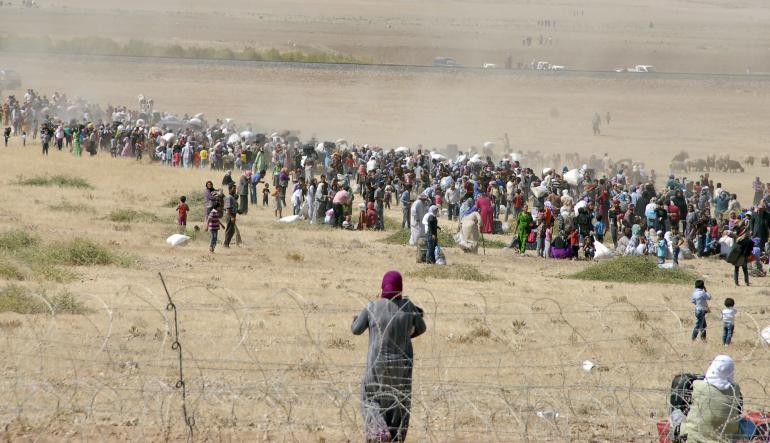A lack of ground support for air strikes against Islamic State jihadists, and Turkey’s reluctance Turkey to step in militarily, have all but sealed the fate of the besieged Syrian border town of Kobane, analysts said Tuesday.
The latest episode of the IS advance in Syria and Iraq has unfurled slowly and painfully in full view of the 60 nations that signed on to a US-led coalition to combat them.
And as black jihadist flags went up in the east of Kobane on Monday, the weaknesses of the air campaign became clear.
“It is practically too late to save Kobane at this stage,” said Mario Abou Zeid, a Beirut-based analyst with the Carnegie Middle East Center.
“The expansion of Islamic State forces in Kobane is new proof that the air strikes campaign is failing to achieve its objective to destroy and dismantle the military capabilities of IS.”
A handful of US air strikes could not halt the jihadists’ blitz on the town, which came after a three-week siege that sent nearly 190,000 people streaming into nearby Turkey.
Outgunned Kurdish fighters have pleaded for more international help, and criticism has mounted over the failure by both the coalition and Turkey to stop the assault.
Air strikes not enough
Analysts agree that without cooperation with ground forces to better coordinate the air strikes, there is little more that the coalition can do to stop the jihadists, who are fighting for control of a long stretch of the border with Turkey for their self-proclaimed “Islamic caliphate”.
“I don’t think anyone was being particularly unrealistic about this,” Michael Clarke, director of the Royal United Services Institute, a defence think-tank, told AFP.
He said the air campaign had succeeded in impeding the free movement of IS fighters, and forced them to change their tactics but “it certainly can’t destroy them.”
“The only way that IS is going to be destroyed is by comparable forces of some sort on the ground.”
With the IS group having penetrated Kobane’s suburbs, where ethnic Kurdish guerrillas are fighting fierce street battles to save the town, it has become “almost impossible” to assist from the air due to the fear of civilian deaths, he said.
Clarke said the only option to save Kobane, one of the main Kurdish cities in Syria, now was either to rapidly send more heavy weapons to the Kurds, or for Turkey to deploy the tanks it has massed on its border.
“From a military point of view, Turkish forces are well capable of driving IS out of Kobane if they chose to cross the border,” Clarke said.
Turkish President Recep Tayyip Erdogan called for cooperation on Tuesday on a ground operation, without offering to send troops himself.
Throughout the siege of Kobane, Turkey’s willingness to help the Kurds has been called into question.
‘Reluctant’ Turkey
The outlawed Kurdistan Workers Party (PKK) has for three decades waged a rebellion for self-rule in Turkey.
Turkey’s parliament last week authorised the government to join the campaign, but so far no plans for military action have been announced.
“There are all sorts of reasons why the Turks may just stand and watch,” Clarke said. “They would be invading another country, and they would be helping a Kurdish minority with whom they have real quarrels.”
Erin Marie Saltman, a senior researcher at the London-based Quilliam think-tank, said a “reluctant” Turkey, as well as other Muslim and Middle Eastern nations, needed to put boots on the ground if any advances were to be made against IS.
“The more other Middle Eastern countries are involved against IS, the less credible IS propaganda is in establishing an Islamic State for all Muslims,” she told AFP.
Saltman said IS forces were not so numerous that “they couldn’t easily be overpowered by an adequate national army.”
“That’s why this is so shocking that they’ve been in essence allowed to take so much territory in Syria and Iraq under destabilized governments.”
She also warned that while the coalition’s attention was drawn to Kobane, the IS fighters could make gains around Baghdad, highlighting the airport outside the Iraqi capital as “a key location that IS will be targeting in the near future”.
Clarke said that as far as international efforts to destroy IS were concerned, “it will get worse before it gets better because the international coalition is not politically very united… (It) is not as solid as it looks on paper.”
Meanwhile if IS jihadists do manage to seize Kobane, their direct access to the Turkish border could endanger the stability of the rest of Europe, warned Carnegie’s Abou Zeid.
He said IS could fight to “exploit its oil and gas resources on the black market” and try and infiltrate militants into Turkey and Europe.











